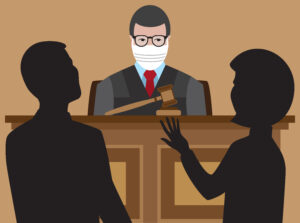
(Photo by Alex Wroblewski/Getty Images)
The amicus brief in the Michael Flynn case is in, and it is scathing.
After the Justice Department moved to dismiss false statement charges against the president’s former National Security Advisor on the eve of sentencing, U.S. District Judge Emmet Sullivan appointed retired Judge John Gleeson, currently of Debevoise & Plimpton, to brief the court on the (im)propriety of the government’s actions, much to the chagrin of Attorney General Bill Barr, who had hoped to put an end to this unpleasantness and spare his boss the indignity of having to expend further political capital to bail out his pals from 2016.
There’s also the matter of whatever October surprise jowly Roy Cohn is cooking up with the Durham Report on the origins of the Russia investigation. Wouldn’t want to step on those headlines about a Russia hoax witchhunt with a reminder of the Trump campaign’s extensive contacts with the Kremlin and screamingly obvious attempts to cover them up!
The case has been on extended junket to the D.C. Circuit, where Judges Rao and Henderson agreed with the government assertion that the court lacks discretion regarding a motion for dismissal — it’s really a demand for dismissal, right Neomi? — only to be disdainfully overruled by their colleagues sitting en banc.
Which brings us to today, where Gleeson delivered his assessment of the government’s eleventh-hour reversal after three years, during which the defendant pled guilty and admitted to the charges under oath at least three times.
To describe the Government’s Motion to Dismiss as irregular would be a study in understatement. In the United States, Presidents do not orchestrate pressure campaigns to get the Justice Department to drop charges against defendants who have pleaded guilty—twice, before two different judges—and whose guilt is obvious. And the Justice Department does not seek to dismiss criminal charges on grounds riddled with legal and factual error, then argue that the validity of those grounds cannot even be briefed to the Court that accepted the defendant’s guilty plea. Nor does the Justice Department make a practice of attacking its own prior filings in a case, as well as judicial opinions ruling in its favor, all while asserting that the normal rules should be set aside for a defendant who is openly favored by the President.
OUCH.
The president has publicly pressured the Justice Department to drop charges against his former NSA for years. As Gleeson notes, the Special Counsel investigation was arguably triggered by Donald Trump’s request that then-FBI Director James Comey “go easy” on Flynn back in February of 2017. Moreover, the government’s assertion that it is just treating Flynn like any other defendant is belied by Barr’s personal intervention in the Flynn case and that of Trump’s longtime pal Roger Stone, who was later pardoned.
Is there another federal defendant who has confessed multiple times to the crime, whose conduct is not in doubt, who has received the benefit of counsel, and against whom charges were dropped post-plea because the government decided it might not be able to prove the conduct already admitted to under oath? Come on.
“It is hard to imagine another case in which the Government has employed such specious reasoning to cast doubt on its own case,” Gleeson notes.
The Justice Department argued that it was entitled to a dismissal of the case without having to explain its reversal after years of arguing that Flynn’s lies to FBI agents about his communications with the Russian ambassador were both deliberate and material. Despite the manifest irregularity of the Department’s conduct, any interrogation of its position is an illegal encroachment on executive authority, they insist.
Gleeson disagrees, writing, “While the Executive is entitled to protect its privileges and deliberations, it is not entitled to offer pretextual reasons and demand that the Court mechanically accept them.”
Later he adds, “As demonstrated by history, Rule 48(a)’s requirement that the Government explain itself exists partly to smoke out the corrupt dismissal of criminal charges against the politically well-connected precisely because they are well-connected.”
Beyond interrogating the government’s motives for dismissing the case, Gleeson urges Judge Sullivan to penalize Flynn for his false statements under oath, both regarding his own conduct, and in accusing the Justice Department of extorting a plea by threatening Flynn’s son.
“The Court can now restore fairness and impartiality to the administration of justice by denying the Government’s motion and accounting for Flynn’s perjurious conduct at the sentencing stage,” he wrote.
So the Flynn case lives to fight another day. Countdown to that pardon in 3…2…
Reply Brief for Court-Appointed Amicus Curiae [USA v. FLYNN, No. 1:17-cr-00232-1 (D.D.C. Sep 11, 2020)]
Elizabeth Dye lives in Baltimore where she writes about law and politics.



 Olga V. Mack is the CEO of
Olga V. Mack is the CEO of 




 Ed. note: This is the latest installment in a series of posts from
Ed. note: This is the latest installment in a series of posts from 









 Kathryn Rubino is a Senior Editor at Above the Law, and host of
Kathryn Rubino is a Senior Editor at Above the Law, and host of